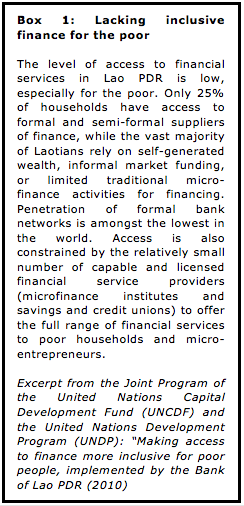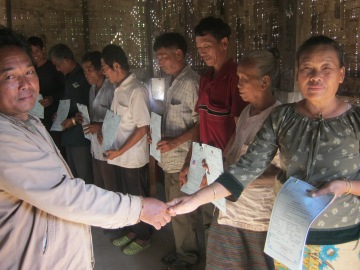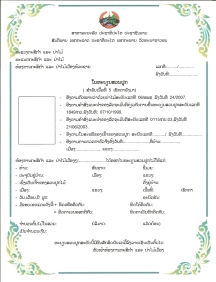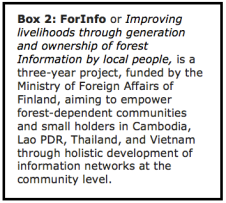RECOFTC’s Grassroots Capacity Building for REDD+ project team shares highlights from the recent national level expert seminar on Gender, Forestry, Climate Change and REDD+, organized jointly by RECOFTC – The Center for People and Forests and the Department of Forestry, Lao PDR.
Despite some well documented studies on the extensive knowledge, skills, and hands-on experience of women in using and managing forests and natural resources in general, the current debate on REDD+ has yet to integrate the existing knowledge and specific forestry based needs and aspirations of women in its planning and policy processes. Unless addressed in time, this omission will have adverse consequences in the long run as the specific needs and aspirations of women will be ignored, pushing them further to the periphery, thus adding to their vulnerability and depriving them from the potential benefits of REDD+.
RECOFTC – The Center for People and Forests and the Department of Forestry in Lao PDR together organized a national seminar on gender, forestry, climate change and REDD+ on February 19, 2013 in Vientiane, Lao PDR, under RECOFTC’s ongoing project “Grassroots Capacity Building for REDD+ in Asia-Pacific.” A total of 45 participants took part including government agencies and the Lao Women’s Union, environmental I/NGO’s, donors, and civil society, among others. The topic seemed to be of particular interest, and demand to participate in the workshop was high.
In his opening remarks, Mr. Khamphay Manivong, the Deputy Director General of the Department of Forestry, Lao PDR, reminded everyone of the important roles played by women in forest management and conservation given their specific knowledge and skills in Lao society. He then emphasized the need to recognize this in the promotion of gender equality in climate change and REDD+ initiatives. He also highlighted the critical importance of building the capacity of women at different levels so they can actively and effectively participate in decision-making processes.
One of the aims of the workshop was to bring everyone onto the same page about existing policies and plans to strengthen gender equality in forest management and national strategy development on REDD+ and climate change. A presentation by the Lao PDR National Focal Point for UNFCCC and the Kyoto Protocol, helped audiences to understand this better. This was followed by presentations from different organizations sharing practical experiences and lessons learned from the field. The speakers helped to identify and gather key issues, challenges, and gaps in the inclusion of women as effective stakeholders in forest based climate change adaptation and mitigation. Having identified the challenges, delegates discussed approaches and methods to address and overcome them, for example by making use of opportunities for gender responsive capacity building initiatives at different levels, and communicating the experience widely in climate change discussions and policy processes in Lao PDR.
The second part of the workshop consisted of a detailed panel discussion with gender experts which elicited a very lively discussion and provided a great networking opportunity for different organizations. A number of potential areas for jointly working towards increased gender awareness, stronger policies, and plans in the forestry sector were identified.
To learn more about this seminar, please see the event press release. Keep an eye on this space for more information on the results of this seminar, including a forthcoming synthesis report and a policy brief.








Building Rural-Urban and Cross-generational Bridges to Discuss Climate Change, Forests, and REDD+
Project Officer Simone Frick reflects on a recent visit to Lao PDR, where RECOFTC’s Grassroots Capacity Building for REDD+ project is carrying out activities on the ground with the assistance of local CSOs.
During a recent visit to Lao PDR, I had the opportunity to participate in a grassroots level awareness raising event initiated by RECOFTC’s Grassroots Capacity Building for REDD+ project and conducted by the Lao civil society organization PADETC (Participatory Development Training Centre).
In a first step, PADETC organized a national training event about climate change and REDD+ for 20 students. The students came from various disciplines and with different motivations. Ms. Thatsany for example explained that she is studying business management and is very interested in development issues. When she completes her studies she would like to apply her gained knowledge and skills in a social enterprise. She highlights that during the training she learned about considering different perspectives in a structured way to achieve a joint goal.
Students interviewing villagers at Nong Waeng village on the second day of the event.
After participating in the student training and feeling comfortable in facilitating a similar event for secondary level students, Ms. Thatsany was selected to conduct a three day event in Bolikhamxay province, around a two hour car drive southeast from the capital Vientiane. Mr. Sommai, who studies mass media and also took part in the student training, was the other facilitator for this event.
Together they explained to 27 secondary level students, between 14 to 18 years old and all volunteers in the local children’s learning center, what the causes and impacts of climate change are, and the possible ways in which forests can help combat climate change through mitigation and adaptation initiatives. REDD+ was introduced as one such possibility. Furthermore, the students learned different interview techniques which they were able to put into practice the next day when they went to nearby Baan Nong Waeng to interview the villagers about their experiences with climate change and the role that the surrounding forests play in their lives. Finally, on the third day of the workshop the students met again to compile the information, the recorded interviews, and write summaries of what they learned from the villagers. The information from all the groups was then pulled together by the leaders of the children’s learning center and has ultimately resulted in a local radio program about climate change and the role of forests, told through the experiences and with quotes shared during the community interviews. These stories have also contributed to a video explaining the villagers’ situation.
Students compiling the information collected from the villagers in groups.
One of the benefits of conducting these interviews was that different generations were able to come together to exchange knowledge. One of the questions asked during the interviews was: “What changes have you observed over the last decades in your village”? The woman being interviewed responded that there have been noticeable changes, such as in rain patterns and long, very dry periods with which the crops, especially rice, are often not able to cope. She mentions that her parents’ generation had full production, she herself has been harvesting around 80% in recent years and this year they only harvested 50% because it was too dry.
The opportunity to interact through the interviews was appreciated by interviewers and interviewees, younger and older generations alike. Reflecting on her exchange with the volunteer, the woman says “Through this interview we have learned again to discuss these issues. Now the older people also learn from the younger generation.”
Compiling the information collected from the villagers in plenum from the different groups.
The 15 year old student on the other hand says “It was very helpful and saddening to see the real impacts of climate change after learning about them the first day. We learned from the villagers about the difficult situations they are in and I hope we can make a change by going back and providing more information with street plays or other tools to help them improve their situation. Furthermore, several of my friends did not have the chance to participate in this training and I look forward to sharing with them what I have learned here.”
RECOFTC’s REDD+ Grassroots program is working to facilitate learning and knowledge-sharing opportunities such as this in all of our project sites in Indonesia, Lao PDR, Myanmar, Nepal, and Vietnam. To learn more about the Grassroots program, please click here.
Share this:
Posted by RECOFTC on April 11, 2013
https://recoftc.wordpress.com/2013/04/11/building-rural-urban-and-cross-generational-bridges-to-discuss-climate-change-forests-and-redd/